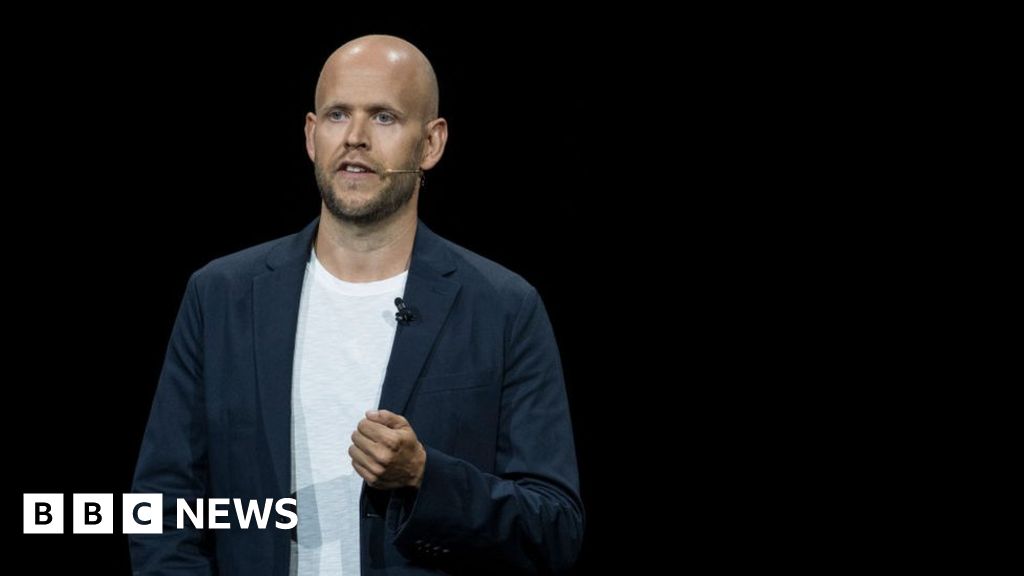- Zoe Kleinman
- Technology Editor
The head of Spotify has said there are no plans to completely ban AI-generated content on the music streaming platform.
Earlier this year, the platform published a track with the voices of artists Drake and The Weeknd cloned using artificial intelligence.
Daniel Ek told the BBC that the technology could be used to create music, but AI should not be used to impersonate human performers without their consent.
He said the use of artificial intelligence in music will likely be discussed for “many, many years.”
Mr Ek, who rarely speaks to the media, said he saw three “buckets” of AI use:
- tools such as autotune that enhance the music, which he felt was acceptable
- instruments imitating artists who didn’t exist
- and the more controversial middle ground, where AI-generated music was clearly influenced by existing artists but did not directly represent them.
“It won’t be easy,” he said when asked about the challenges facing the industry.
While artificial intelligence is not prohibited in all forms on the platform, the company does not allow its content to be used to train machine learning models or artificial intelligence models, the likes of which can then create music.
Artists are increasingly speaking out against the use of AI in the creative industries.
Last month, Irish musician Hozier said he would consider striking over the threat AI poses to his profession.
Neither Drake nor The Weeknd were aware of the cloned versions of their voices used in the song Heart on My Sleeve. The track was removed from Spotify and other streaming platforms in April.
Image Source, Getty Images
Drake and The Weeknd performing together in Nottingham in 2014.
Its creator, Ghostwriter, later tried to nominate the track for a Grammy Award, but was rejected.
“You can imagine someone uploading a song claiming to be Madonna even though they’re not. We’ve seen almost everything in Spotify’s history at this point where people have tried to game our system,” Mr. Ek said.
“We have a very large team that works on exactly these types of problems.”
In May, the Financial Times reported that thousands of tracks were removed from Spotify after it was discovered that bots were being used to artificially inflate their streaming figures.
Mr Ek also highlighted the platform’s huge investment in podcasts, including from high-profile figures such as Michelle and Barack Obama and the Duke and Duchess of Sussex. None of them were recommissioned.
Harry and Meghan’s deal reportedly cost $25 million (£18 million) and produced just 12 episodes over two and a half years. It was recently reported that a Spotify executive disparaged the couple’s work ethic.
“The truth is, some of it worked, some of it didn’t,” Mr. Ek said of the firm’s decision to “challenge Apple” as the market-leading podcast platform by recruiting a slew of new creators.
“Five years ago, Spotify wasn’t in the podcast space.”
Separately, the firm confirmed that Russell Brand’s podcast will remain on Spotify unless the material itself is found to violate its own terms.
Acast, which owns the podcast, said it had suspended advertising revenue as the comedian remains under investigation over sexual assault allegations.
The reason Sweden-based Daniel Ek came to the UK was to discuss regulation. He said the firm supports the upcoming Internet Safety Bill, which aims to make the Internet safer for children, as well as the current Digital Markets Bill, which aims to improve competition by scrutinizing tech giants.
Mr. Ek has long been a vocal critic of the policies of the Apple and Google app stores that Spotify relies on. Both companies charge small developers a 15% commission on in-app purchases, rising to 30% for developers with more than $1 million in revenue.
Spotify also complained that Apple was preventing businesses from communicating directly with their customers and promoting their services elsewhere.
“We are in a situation where literally two companies in the world control access to the Internet for more than four billion consumers,” Mr. Ek said.
“If you now think about a company like Spotify, where we already pay almost 70% of our revenue back to the creative community, if we took 30% of our share, that would essentially mean we were left with zero.” . which means we will have to close the store.”
Apple said it continues to work with the EU. It added that the vast majority of European developers are developers who earn less than $1 million and are eligible to pay Apple a 15% commission.

